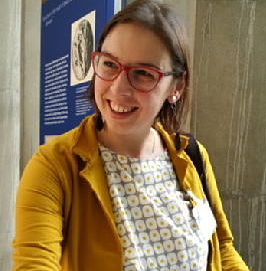346. Cecilia Muratori on Animals in the Renaissance
An interview with Cecilia Muratori, an expert on the surprisingly modern ideas about non-human animals that emerged in the Renaissance.
Themes:
• C. Muratori and G. Paganini (ed.), Early Modern Philosophers and the Renaissance Legacy (Dordrecht: 2016).
• C. Muratori and B. Dohm (eds), Ethical Perspectives on Animals in the Early Modern Period (Galluzzo: 2013).
• C. Muratori (ed.), The Animal Soul and the Human Mind: Renaissance Debates (Pisa: 2013).
• C. Muratori, “Medical and Ethical Aspects of Vegetarianism: On the Reception of Porphyry’s De abstinentia in the Renaissance,” in M. Gadebusch Bondio (ed.), Medical Ethics: Premodern Negotiations between Medicine and Philosophy (Stuttgart: 2014), 143-60.
• C. Muratori, “Between Machinery and Rationality: Two Opposing Views on Animals in the Renaissance – and Their Common Origin,” Lo Sguardo 18 (2015), 11-22.
• C. Muratori, “From Animal Bodies to Human Souls: Animals in Della Porta’s Physiognomics,” Early Science and Medicine 22 (2017), 1-23.
• C. Muratori, “Real Animals in Ideal Cities: The Place and Use of Animals in Renaissance Utopian Literature,” Renaissance Studies 31 (2017), 223-39.
• C. Muratori, “‘In Human Shape to Become the Very Beast!’ Henry More on Animals,” British Journal for the History of Philosophy 25 (2017), 897-915.
• C. Muratori, "Animals in the Renaissance: You Eat What You Are," in P. Adamson and F. Edwards (eds), Animals: A History (Oxford: 2018), 163-86.
• C. Muratori, Renaissance Vegetarianism: the Philosophical Afterlives of Porphyry’s On Abstinence (Cambridge: 2020).







Comments
Cannibals and Elephants
Another great interview: Interesting topic, knowledgeable guest and entertaining conversation.
Never realised the philosophical challenges cannibals and elephants would pose.
This interview was also one of the first moments I realised that I start to link names to subjects, schools of thought and events that you have addressed in older episodes. This makes the series even more enjoyable. Keep up the great work!
Animals on trial
I thought of asking this when you touched on this topic in the section on medieval philosophy. How does this thinking touch on the occasional medieval tradition of treating animals as moral actors capable, e.g., of being put on trial for murder, adultery, or other crimes. There are known cases of trials of animals for both. One would think moral culpability would necessitate some ability to choose, and this would conflict with the classical aristotelian definition of humanity as the rational animal. Is there any indication that Renaissance authors were familiar with this legal tradition or discussed its underpinnings in any philosophical way? See, e.g. https://daily.jstor.org/when-societies-put-animals-on-trial/
In reply to Animals on trial by Andrew T
Animals on trial
Yes, that's a fascinating bit of historical lore, isn't i? I think maybe it came up when I interviewed Juhana Toivanen in the Medieval series? (Hard to check with interviews since I don't have a transcript of them.) I don't think this comes up in Muratori's book on animals in the Renaissance so I am guessing it was no longer a practice at that stage or discussed by them.
Add new comment